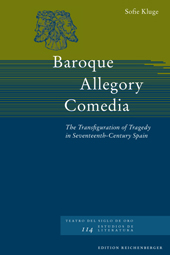 |
Sofie Kluge
Baroque – Allegory – Comedia. The Transfiguration of Tragedy in Seventeenth-Century Spain
2010, x, 330 pp., english
(Estudios de Literatura 114)
ISBN: 978-3-937734-60-6
€ 67,-
|
|
|
|
|
|
|
|
|
|
|
|
|
|
Professor Kluge’s examination of the Baroque marginalization of tragedy takes off from an analysis of the crucial role played by allegory in central fields of seventeenth-century culture such as political theory, education, mythography, literary criticism, and dramatic theory. The emergence of the term comedia as the generic designation of the drama is presented as intricately intertwined with the allegorical outlook dominating these fields, and, especially, as an effect of the ambiguous re-moralization of aesthetics that is also observable in the period’s famous literary feuds. The Baroque terminological development must consequently be seen as a central element in the highly equivocal contemporary revitalization of the Christian aesthetic tradition as a countermeasure to cultural decadence. As La vida es sueño shows, the serious comedia is eminently concerned with the transfiguration of the tragic in its various forms of historical pessimism and the ‘tragic view of life’, the moral tragedy of ‘neopagan’ secularism, and, not the least, ancient tragedy as an authoritative art form. However, although tragedy may be marginalized on a terminological level, it is by no means absent from the serious Baroque comedia, which is a tragicomic theatrum mundi rather than a comedy in the Aristotelian sense of the term.
|
|
|
|
|
La investigación de la profesora Kluge de la marginación de la tragedia en la cultura áurea parte de un análisis del papel clave que jugó la alegoría en campos culturales importantes como la teoría política, la educación, la mitografía, la crítica literaria y la preceptiva dramática. La emergencia del término ‘comedia’ como designación genérica del drama barroco se desvela como un proceso íntimamente relacionado con la óptica alegórica dominante en estos campos y, más específicamente, como efecto de la remoralización ambigua de la estética literaria que se vislumbra en las famosas polémicas literarias del período. La evolución terminológica barroca hay que verla, según la autora, como elemento importante de la revitalización paradójica de la tradición estética cristiana que le sirvió al Barroco de antídoto contra la decadencia cultural contemporánea. Como demuestra una obra como La vida es sueño, la comedia seria barroca gira exactamente entorno a la transfiguración de lo trágico en sus varios sentidos: el pesimismo histórico y el ‘sentimiento trágico de la vida’, la tragedia moral de la secularización ‘neopagana’ y, más específicamente, la tragedia antigua como modelo ideal autorizado. Sin embargo, aunque la tragedia se haya marginado terminológicamente no está ausente del universo de la comedia seria barroca que, más que una comedia en el sentido aristotélico, es un teatro del mundo tragicómico.
|
|
|
|
|
Bogens undersøgelse af den barokke udgrænsning af tragedien bygger på en analyse af allegoriens centrale rolle i væsentlige dele af sekstenhundredetals kulturen, herunder den politiske teori, uddannelsessystemet, mytografien, litteraturkritikken og den dramatiske teori. Comedia-begrebets opkomst som genrebetegnelse for dramaet fremstilles som intimt sammenvævet med den allegoriske optik, der dominerer disse områder, og i særlig grad som et udtryk for den yderst tvetydige re-moralisering af det æstetiske felt, der kommer så tydeligt til udtryk i periodens berømte litterære fejder. Barokkens terminologiske udvikling må følgende forstås som et centralt element i periodens dobbeltbundede revitalisering af den kristne tradition som modtræk til den omsiggribende historiske dekadence. Som Calderóns La vida es sueño viser, handler den seriøse comedia netop om overvindelsen af det tragiske, herunder den historiske pessimisme, den ’nyhedenske’ sekularismes tragik og den antikke tragedie som autoritativt forlæg. Selvom tragedien udgrænses på et terminologisk plan er den imidlertid ikke fraværende fra den seriøse barokke comedia, der snarere er et tragikomisk verdensteater end en komedie i aristotelisk forstand.
|
|
|
|
|
Published with the support of: / Udgivet med støtte fra:
Lillian og Dan Finks Fond
Kirsten Schottlænders Fond
|
|
|
|
|
|
|
|
|
|
|
|
|
Dr. Sofie Kluge is a literary historian specialized in the Spanish Golden Age and the European Baroque. She obtained her PhD degree in Comparative Literature from the University of Copenhagen, where she is affiliated as a Carlsberg postdoctoral Fellow. She is currently working on a research project on the different forms of Baroque ‘mythological literature’.
Sofie Kluge es doctora en Literatura Comperada (Universidad de Copenhague). Especializada en la literatura barroca española y europea trabaja de momento en un proyecto postdoctoral sobre las distintas formas de la ‘literatura mitológica’ barroca.
Sofie Kluge er ph.d. i Litteraturvidenskab fra Københavns Universitet, specialiseret i spansk guldalder og den europæiske barok. Hun arbejder for tiden på et treårigt forskningsprojekt, sponsoreret af Carlsbergfondet, om den ’mytologiske litteraturs’ forskellige former.
|
|
|
|
|
|
|
|
|
|
|
|
|

